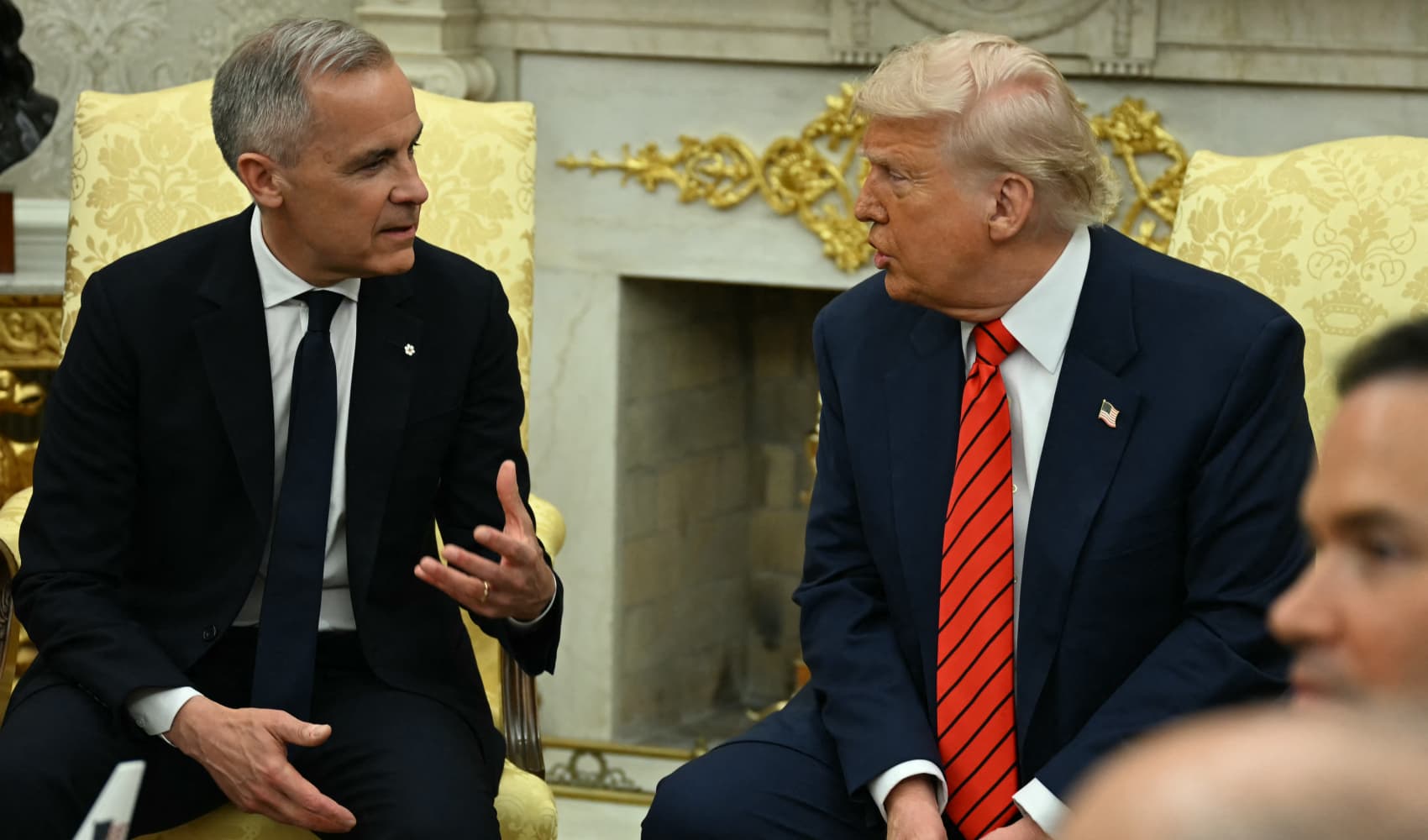Canada to Trump: Not For Sale, Ever! (Sovereignty at Stake)
Carney to Trump: Canada's Sovereignty – Never for Sale!
Introduction: A Line in the Maple Leaf
Imagine someone walking into your house and offering to buy it – not just the house, but your whole life, your history, your identity. Sounds absurd, right? Well, that's the essence of the recent exchange between Canadian Prime Minister Mark Carney and former U.S. President Donald Trump. The core message? Canada isn't for sale, not now, not ever. But what sparked this firm declaration of sovereignty, and what does it mean for the future of the relationship between these two North American giants?
The Spark: Trump's Ambitions and Canadian Ire
The tension brewing between Canada and the U.S. under Trump's administration wasn't exactly a secret. Trump's aggressive trade tactics, his insistence on rewriting trade agreements like NAFTA (now USMCA), and, yes, even the occasional musing about Canada becoming the 51st U.S. state, all contributed to a sense of unease north of the border. But why the "51st state" talk? What prompted it?
The Trade Wars and Their Fallout
Trump's focus on "America First" often translated into imposing tariffs on goods, including those from Canada. This, understandably, didn't sit well with Canadians who viewed these actions as unfair and detrimental to their economy. These trade wars fueled a sense of national pride and a determination to protect their sovereignty.
The Rise of Carney: A Response to Trump's Policies
In this climate of uncertainty and resentment, Mark Carney and his Liberal Party emerged victorious, tapping into the very real anxieties of Canadians about their country's future. He was elected on a platform that strongly emphasized Canadian independence and a commitment to standing up to what many perceived as bullying tactics from the U.S.
The Oval Office Showdown: "Never Say Never"
The meeting between Carney and Trump, therefore, was highly anticipated. The exchange that followed, though brief, was incredibly telling. When Carney stated emphatically that Canada was "not for sale" and "won't be for sale ever," Trump's response – a casual "Never say never" – sent ripples through the political world. What did he mean by that?
Decoding Trump's Response: A Power Play?
Was Trump simply being provocative? Or was there a genuine underlying belief that Canada could, at some point, be swayed to join the United States? Regardless of his intent, the exchange highlighted the stark differences in their perspectives on the relationship between the two countries.
Canada's Identity: More Than Just a Neighbor
For Canadians, the idea of becoming the 51st state isn't just about politics; it's about identity. Canada has its own unique culture, history, and values. It's a nation fiercely proud of its social safety net, its multiculturalism, and its commitment to peacekeeping on the world stage. Giving that up for a seat at the American table is simply not an option for most Canadians.
The Importance of Sovereignty: A National Treasure
Sovereignty is the bedrock of any nation. It's the right to self-determination, the ability to make its own laws, control its own borders, and chart its own course in the world. Carney's statement wasn't just about rejecting a specific offer; it was a reaffirmation of Canada's commitment to its own sovereignty.
The Economic Realities: Interdependence, Not Absorption
While the political rhetoric can be heated, the economic reality is that Canada and the U.S. are deeply intertwined. They are each other's largest trading partners, and millions of jobs on both sides of the border depend on a smooth flow of goods and services. But interdependence doesn't mean absorption. Canada wants a fair and mutually beneficial relationship, not a merger.
USMCA: A Testament to Partnership, Not Possession
The renegotiation of NAFTA into USMCA demonstrated the complexities of the economic relationship. While the process was often contentious, the eventual agreement signaled a commitment to working together, even if disagreements remain. The agreement highlights the necessity of trade between the countries, but also Canada's resolve to negotiate on its own terms.
The Geopolitical Implications: Canada's Role in the World
Canada plays a significant role on the international stage, often acting as a bridge between different perspectives and cultures. Its membership in organizations like the G7, NATO, and the Commonwealth gives it a voice that extends far beyond its population size. Becoming the 51st state would diminish that role and limit its ability to act as an independent player.
The Arctic and Global Security: A Canadian Responsibility
Canada's vast northern territory and its control over much of the Arctic region give it a unique responsibility in terms of global security and environmental protection. Maintaining its sovereignty in the Arctic is crucial for protecting its own interests and for contributing to the overall stability of the region.
The Future of the Relationship: Navigating Uncertainty
The relationship between Canada and the U.S. will likely continue to be complex and occasionally fraught with tension. However, the fundamentals remain strong: shared values, deep economic ties, and a long history of cooperation. The challenge will be to navigate these complexities while respecting each other's sovereignty and independence.
Beyond Trump: A New Era of Diplomacy?
While the exchange between Carney and Trump was a defining moment, it's important to remember that it was just one chapter in a long story. With a new administration in Washington, there's an opportunity to reset the relationship and focus on areas of mutual interest, such as climate change, global health, and economic recovery.
Building Bridges, Not Walls: A Path Forward
The key to a successful future relationship lies in open communication, mutual respect, and a willingness to compromise. Building bridges, not walls, should be the guiding principle. Canada and the U.S. have a lot to gain from working together, but only if they do so as equals.
The Power of "Never": A Symbol of Canadian Resolve
Ultimately, Carney's simple yet powerful declaration – "Canada won't be for sale ever" – resonated so deeply because it captured the essence of Canadian identity and resolve. It was a statement of defiance against what many saw as bullying tactics and a reaffirmation of Canada's commitment to its own sovereignty. It's a reminder that some things are simply not negotiable.
Conclusion: Standing Strong, Side by Side
The "Carney to Trump" exchange may seem like a minor incident, but it encapsulates the enduring complexities of the Canada-U.S. relationship. While economic interdependence is a reality, so too is Canada's unwavering commitment to its own identity and sovereignty. The message is clear: Canada values its partnership with the U.S., but it will never compromise its independence. The path forward requires mutual respect, open communication, and a recognition that true strength lies not in absorption, but in standing strong, side by side.
Frequently Asked Questions
- What exactly did Trump say about Canada becoming the 51st state?
While there's no official record of a formal offer, Trump repeatedly mused about the idea of Canada joining the U.S., often in informal settings or public statements. These remarks were often perceived as insensitive and dismissive of Canada's sovereignty. - Why was there so much anger in Canada towards Trump's policies?
Trump's imposition of tariffs on Canadian goods, particularly steel and aluminum, was seen as unfair and harmful to the Canadian economy. These actions were perceived as a violation of long-standing trade agreements and a betrayal of the close relationship between the two countries. - How did Mark Carney's election as Prime Minister relate to Trump's actions?
Carney's victory reflected a growing sense of unease among Canadians about Trump's policies and a desire for strong leadership that would stand up for Canada's interests. His campaign focused on protecting Canadian sovereignty and ensuring a fair relationship with the U.S. - What is the current state of the relationship between Canada and the U.S.?
The relationship remains complex, with both areas of cooperation and areas of disagreement. The USMCA trade agreement provides a framework for economic cooperation, but challenges remain in areas such as energy, climate change, and border security. - Is there any real possibility of Canada ever becoming part of the United States?
While the idea is occasionally floated in political circles, there is virtually no public support for it in Canada. The vast majority of Canadians are fiercely proud of their country's identity and independence, and there is no desire to become a part of the United States.

